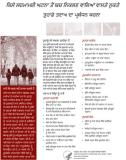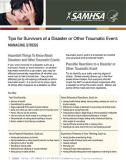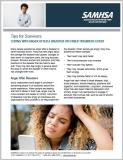
Punjabi version of NMH05-0209R, prompted by a violent incident at a Sikh temple in Wisconsin in August 2012.Gives stress prevention and management tips for dealing with the effects of trauma, mass violence, or terrorism. Lists tips to relieve stress, describes how to know when to seek professional help, and provides accompanying resources.
Units per Product
Download
Disaster Response: Tips for Managing Stress (Punjabi)
File Type: PDF
File Size: 1004 KB





